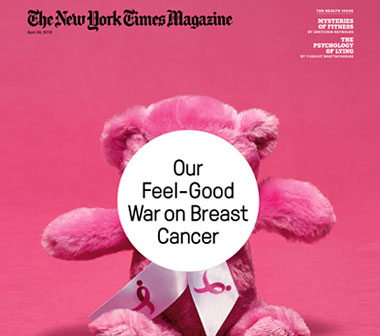More than 20 years ago, I ran a support group for women with metastatic breast cancer. The group was supposed to run for eight weeks, but it ran for just over two years, until the last woman in my group passed away. At that time, metastatic breast cancer was a death sentence, and people asked me how I could do such depressing work. I explained to them that despite the loss of group members, each week I received more gifts of insight, kindness and love from those women than I was ever able to give back to them as the group facilitator.
In the years that followed, I, like all of my friends and colleagues, religiously went for an annual mammogram. I held my breath through the process, hoping like mad that all would be ok, and heaved a sigh of relief when it was. Many of the people I knew were not so lucky, but despite their diagnoses of breast cancer, they reassured themselves that at least they had caught their cancer early.
So it was with dismay that I read Peggy Orenstein’s article in the April 28th issue of The New York Times Magazine called “The Problem With Pink.” And the cover of the magazine was even more disturbing entitled, “Our Feel-Good War on Breast Cancer” with the subheading “Has raising awareness become more important than saving lives?”
The article points out many statistics, which show that gains in treatment and in saving lives are due more to better treatments and understanding of different kinds of breast cancer than to early diagnosis. It highlights the high number of false positive results and unnecessary treatments resulting from mammograms. Most disturbing, it points out that this country’s pink ribbons and Power of Pink campaigns, empowering national symbols to women, have created an unhealthy over awareness of the disease. Orenstein believes that these symbols have turned women into victims or survivors. I believe that they have proven to women that their collective voices can accomplish great things.
We can examine the statistics in many ways, and I have no doubt that those cited by Orenstein, herself a breast cancer survivor, are indeed true. The problem is that none of us would take a chance on detecting cancer later, rather than sooner. And, none of us would forgo a treatment for cancer simply because the chance of success is not statistically significant. When you have cancer, you are the only statistic that matters. Many years ago, a friend asked me if she should opt for chemotherapy or just radiation. Her oncologist had told her that the statistics regarding chemo were not highly favorable. She did the chemo anyway, is alive today, and would never have considered making a different decision.
For sure, mammography is not the single solution to breast cancer. It is important for women to be aware of their risk factors, screening, treatments and survival rates, but we must be careful that these statistics are not used by insurance companies to save money at the cost of women’s lives by denying them payment for annual mammograms.
Awareness leads to knowledge and knowledge is power. If we take away awareness of the disease, women will not be aware that there are facts to be learned. Orenstein states, “All that well-meaning awareness has ultimately made women less conscious of the facts.” Yet, we do not know how much less informed they would be if there had been no pink ribbon.
A passionate and eloquent breast cancer survivor sent me the following email after we had a lively discussion about the article. “I agree that we are at a critical juncture in our common quest to cure breast cancer, which requires us to own up to the hard fact that despite all the advances made in early detection awareness and preventative screening, the death rate from this deadly disease still remains staggering. This does not mean that early detection no longer remains a critical component in the prevention of breast cancer, but it does require us to rethink how breast cancer funds need to be allocated. And…metastasis research has been painfully underfunded. Until we take the next step and focus on metastasis research funding with the same tenacity that we did to improve early detection screening, the cure will forever escape us. We cannot let our fear that a renewed focus on research will result in forfeiture of our hard earned ‘medical right’ to early screenings. We are smarter than that and we are stronger than that. We are the generation that will cure breast cancer because we understand that there is no silver bullet, but a combination of factors…awareness, early detection, treatment and research…and we will fight until every single one of them is achieved.” She said it perfectly.
For the American Cancer Society’s (ACS) thoughts on Peggy Orenstein’s article, visit the blog of Otis W. Brawley, M.D., ACS Chief Medical Officer.

